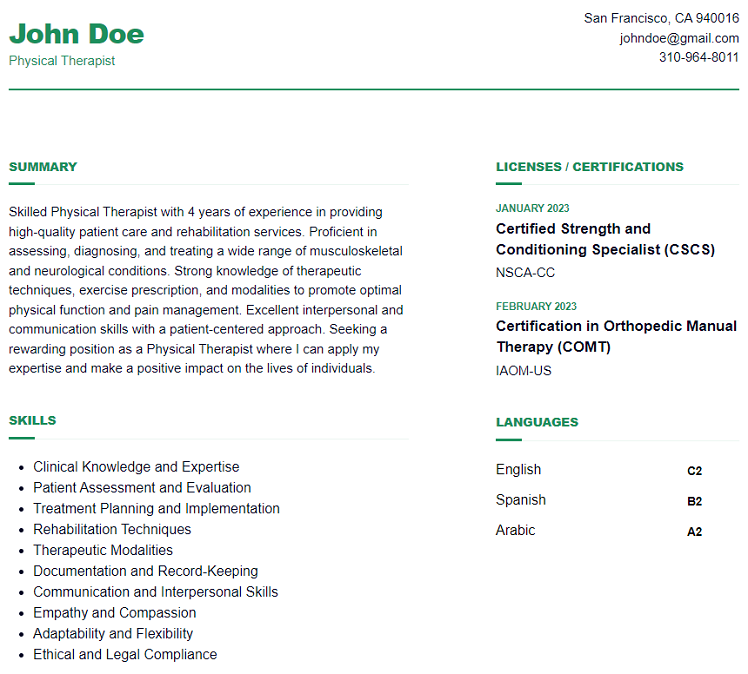Are you considering a career as a physical therapist? As you embark on this journey, it’s crucial to understand the essential skills that can make your resume stand out to potential employers.
Physical therapists work in different healthcare settings, including clinics, private practices, sports facilities, schools, and hospitals. They also provide home healthcare services. This diversity allows physical therapists to work with a wide range of patients and conditions.
A well-crafted resume highlighting your key qualifications can significantly enhance your chances of landing your dream job in the field of physical therapy.
In this article, we will explore the fundamental skills that every physical therapist should possess and effectively showcase in their resume.

Table of Contents
Core Skills for Physical Therapists
Clinical Knowledge and Expertise
As a physical therapist, you must possess a solid understanding of anatomy, physiology, kinesiology, and other related disciplines. A comprehensive knowledge of musculoskeletal and neurological systems will enable you to accurately assess and diagnose patients’ conditions, devise appropriate treatment plans, and track their progress effectively.
Patient Assessment and Evaluation
A crucial aspect of being a physical therapist is the ability to assess and evaluate patients to determine their specific needs and goals. Proficiency in conducting thorough evaluations, identifying impairments, and developing personalized care plans is essential for providing optimal patient care.
Treatment Planning and Implementation
Based on your assessments, you should be able to design and implement effective treatment plans tailored to each patient’s unique requirements. This skill involves selecting appropriate therapeutic exercises, manual techniques, and modalities to aid in patients’ recovery and rehabilitation.
Rehabilitation Techniques
Physical therapists employ various rehabilitation techniques to restore function, alleviate pain, and enhance patients’ mobility. Proficiency in techniques such as therapeutic exercises, joint mobilization, neuromuscular reeducation, and gait training will significantly contribute to your effectiveness as a therapist.
Therapeutic Modalities
Therapeutic modalities, including heat and cold therapy, ultrasound, electrical stimulation, and traction, are frequently utilized in physical therapy practice. Understanding the principles behind these modalities and their appropriate applications is vital for delivering comprehensive patient care.
Documentation and Record-Keeping
Accurate and detailed documentation is essential in the healthcare industry. Physical therapists must possess excellent record-keeping skills to maintain comprehensive patient records, track progress, and ensure adherence to legal and ethical standards.
Communication and Interpersonal Skills
Great communication is a cornerstone of successful patient care. Being able to establish rapport, actively listen, and clearly convey information to patients, their families, and other healthcare professionals is crucial for optimal outcomes.
Empathy and Compassion
Physical therapy often involves working with individuals who are experiencing pain, limited mobility, or other physical challenges. Demonstrating empathy, compassion, and a caring demeanor can have a significant positive impact on patients’ well-being and their trust in you as their therapist.
Problem-Solving Abilities
Every patient presents unique challenges and requires individualized care. As a physical therapist, you should possess strong problem-solving skills to identify barriers to progress, develop alternative approaches, and adjust treatment plans as necessary.
Adaptability and Flexibility
The healthcare field is constantly evolving, and as a physical therapist, you must be adaptable to changes in treatment approaches, technologies, and industry regulations. Flexibility in adjusting to different work environments and patient populations is also crucial.
Time Management and Organizational Skills
Physical therapists often juggle multiple patients and tasks simultaneously. Effective time management and organizational skills will enable you to prioritize patient care, manage administrative responsibilities, and maintain a productive and efficient workflow.
Physical Stamina and Endurance
Physical therapy can be physically demanding, requiring therapists to stand for long periods, assist patients with mobility, and perform manual techniques. Maintaining physical stamina and endurance is essential to provide consistent, quality care.
Continuous Learning and Professional Development
The field of physical therapy is dynamic, with advancements in research and treatment approaches occurring regularly. Demonstrating a commitment to ongoing learning, staying updated with the latest evidence-based practices, and pursuing continuing education opportunities will enhance your professional growth and expertise.
Ethical and Legal Compliance
Adhering to ethical and legal standards is vital in healthcare. Physical therapists must demonstrate integrity, maintain patient confidentiality, and adhere to applicable laws, regulations, and professional codes of conduct.
How to Showcase Your Physical Therapist Skills in a Resume
Now that we have explored the core skills required for physical therapists, let’s discuss how you can effectively showcase these skills in your resume.

- Carefully read the job description and find the skills and qualifications that the employer is looking for. Edit your resume to focus on those specific skills and match them with your own experiences and achievements.
- In your resume’s skills section, prominently feature the core skills we discussed earlier. Additionally, emphasize any specialized skills or areas of expertise that differentiate you from other candidates.
Support your skills with specific examples from your professional experiences. Describe situations where you successfully applied these skills and achieved positive outcomes. - Whenever possible, provide measurable evidence of your skills by quantifying your achievements. For example, mention the number of patients you treated, the success rates of your interventions, or the improvement in patients’ functional abilities.
- Use action verbs to describe your experiences and skills. Action verbs like “assessed,” “developed,” “implemented,” “collaborated,” and “achieved” convey a sense of competence and proactivity.
List any relevant continuing education courses or certifications you have obtained. This demonstrates your commitment to professional development and staying current with the latest advancements in the field. - To ensure your resume passes through applicant tracking systems (ATS) and reaches the hands of hiring managers, incorporate relevant keywords and industry-specific terminology. This will make it more likely that your resume will pass the preliminary screening process.
- Make sure your resume is well-organized. Use headings, bullet points, and appropriate formatting to make it easy for employers to scan and quickly identify your key qualifications.
Where to Put Skills on a Physical Therapist Resume
When crafting your physical therapist resume, effectively showcasing your skills is crucial to grab the attention of hiring managers. To ensure your skills are prominently displayed and easily noticed, consider the following sections where you can include them:
Summary/Objective Statement
Begin your resume with a summary or objective statement that highlights your key qualifications and skills relevant to the position. Incorporate specific skills such as “clinical knowledge,” “assessment and evaluation,” “treatment planning,” and “communication skills.” This section provides a quick snapshot of your expertise, immediately capturing the reader’s attention.
Skills Section
Dedicate a separate section to list your skills. You can title this section “Skills,” “Core Competencies,” or “Technical Proficiencies.” Use bullet points or a table format to clearly present your skills. Include a mix of technical and soft skills such as “rehabilitation techniques,” “therapeutic modalities,” “communication and interpersonal skills,” and “problem-solving abilities.” Tailor the skills to match the job description and emphasize the most relevant ones for the position you’re applying for.
Experience Section
In the experience section, incorporate your skills within the descriptions of your previous roles and accomplishments. For each position, highlight how you utilized your skills to provide effective patient care and achieve positive outcomes. Use action verbs to start your bullet points, such as “assessed,” “treated,” “developed,” and “implemented.” For example:
“Assessed patients’ conditions and developed individualized treatment plans utilizing clinical knowledge, evaluation skills, and evidence-based practice.”
Certifications and Licensure
Include a section specifically for your certifications and licensure. Mention any specialized certifications or advanced training you have obtained that showcase your expertise. This section can reinforce your skills and qualifications, adding credibility to your resume.
Education Section
While primarily focused on your educational background, the education section can also be an appropriate place to mention any relevant coursework or academic projects that highlight specific skills. For example, if you completed coursework on “manual therapy techniques” or “neurorehabilitation,” include these details under your educational qualifications.
Conclusion
Crafting a compelling resume that effectively showcases your physical therapist skills is essential for standing out in the competitive job market. By highlighting your clinical knowledge, assessment abilities, treatment planning expertise, and other core skills, you can present yourself as a highly qualified candidate.
Remember to tailor your resume to each job application, provide concrete examples of your skills in action, and demonstrate your commitment to ongoing professional development. With a well-crafted resume that emphasizes your unique qualifications, you can increase your chances of securing your desired position as a physical therapist.
Frequently Asked Questions (FAQs)
What are the most in-demand skills for physical therapists?
The most in-demand skills for physical therapists include clinical knowledge and expertise, patient assessment and evaluation, treatment planning and implementation, communication and interpersonal skills, and problem-solving abilities.
Should I include my clinical placements in the resume?
Yes, including your clinical placements in your resume can demonstrate your hands-on experience and practical skills gained during your training.
Is it important to mention any specialized training or certifications?
Yes, mentioning specialized training or certifications relevant to physical therapy can enhance your resume and showcase your commitment to professional growth and expertise.
What format should I use for my physical therapist resume?
Use a professional and well-structured format for your physical therapist resume. Include clear headings, bullet points, and concise yet informative descriptions of your skills and experiences.